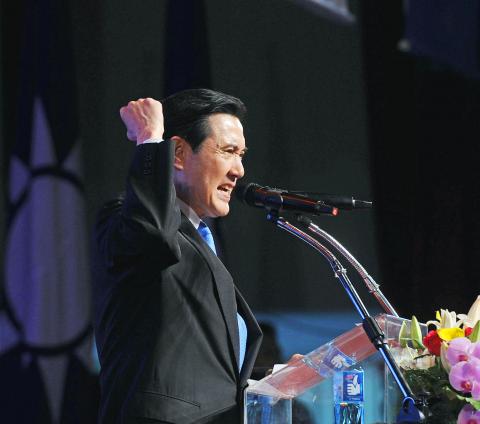The Chinese Nationalist Party (KMT) yesterday attempted to bury its internal dispute over Legislative Speaker Wang Jin-pyng’s (王金平) party membership at its 19th national congress, downplaying a proposal tabled at the event to reinstate him.
The speaker’s membership was revoked by the KMT Central Evaluation and Discipline Committee on Sept. 11 over allegations that he engaged in improper lobbying and amid his political wrangling with President Ma Ying-jeou (馬英九), who doubles as KMT chairman.
Wang’s supporters within the party signed a petition they presented at the congress demanding he be allowed to rejoin the party.

Photo: CNA
Citing it as a key to reconciling and reuniting the party, KMT Central Standing Committee member Lin Rong-te (林榮德) raised the proposal during the congress’ discussion session, but toned down criticism of the leadership’s handling of the issue.
“We [Wang’s supporters] hope that the party will reinstate speaker Wang’s membership in a dignified, harmonious manner. This is the consensus of most party members,” he said.
KMT Vice Chairman Tseng Yung-chuan (曾永權) said the party would address the proposal later, but did not give a timetable.
The proposal was drawn up after Wang indicated earlier this month that he expects to return to the KMT at the request of party delegates.
However, the party leadership subsequently made clear it has no plans to reinstate the speaker.
Major KMT politicians have continued to voice their support for Wang, as the party leadership has sought to play down the importance of the issue.
Both Taipei Mayor Hau Lung-bin (郝龍斌) and New Taipei City (新北市) Mayor Eric Chu (朱立倫) said the party should value Wang’s contributions and continue to communicate with him to resolve the matter.
However, former Taipei EasyCard Corp chairman Sean Lien (連勝文) said the dispute over Wang’s membership is complicated and should be handled carefully.
“I don’t think [reinstating Wang’s party membership alone] would resolve political rift. It’s not that simple,” he said.
Meanwhile, divisions over a proposal seeking to extend the term of Central Standing Committee members from one year to two forced the issue to be put to a vote at the congress, with 583 of 861 party delegates voting in favor of the move.
The party leadership had originally intended to pass the proposal without a vote, but delegate Lee Po-rong (李柏融) protested against the measure, shouting at Ma and other party officials: “Put the issue to vote.”
After Lee was escorted out of the congress by security, the KMT leadership agreed to hold a vote and the proposal was passed.
As he concluded the congress, Ma said the party welcomed the expression of varying opinions at the event and put disputed issues to a vote when a consensus could not be reached otherwise.
“We are a democratic party and members do not necessarily agree on everything. When there are different opinions, we seek consensus via votes,” he said.

NEXT GENERATION: The four plants in the Central Taiwan Science Park, designated Fab 25, would consist of four 1.4-nanometer wafer manufacturing plants, TSMC said Taiwan Semiconductor Manufacturing Co (TSMC, 台積電) plans to begin construction of four new plants later this year, with the aim to officially launch production of 2-nanometer semiconductor wafers by late 2028, Central Taiwan Science Park Bureau director-general Hsu Maw-shin (許茂新) said. Hsu made the announcement at an event on Friday evening celebrating the Central Taiwan Science Park’s 22nd anniversary. The second phase of the park’s expansion would commence with the initial construction of water detention ponds and other structures aimed at soil and water conservation, Hsu said. TSMC has officially leased the land, with the Central Taiwan Science Park having handed over the

The Philippines is working behind the scenes to enhance its defensive cooperation with Taiwan, the Washington Post said in a report published on Monday. “It would be hiding from the obvious to say that Taiwan’s security will not affect us,” Philippine Secretary of National Defense Gilbert Teodoro Jr told the paper in an interview on Thursday last week. Although there has been no formal change to the Philippines’ diplomatic stance on recognizing Taiwan, Manila is increasingly concerned about Chinese encroachment in the South China Sea, the report said. The number of Chinese vessels in the seas around the Philippines, as well as Chinese

URBAN COMBAT: FIM-92 Stinger shoulder-fired missiles from the US made a rare public appearance during early-morning drills simulating an invasion of the Taipei MRT The ongoing Han Kuang military exercises entered their sixth day yesterday, simulating repelling enemy landings in Penghu County, setting up fortifications in Tainan, laying mines in waters in Kaohsiung and conducting urban combat drills in Taipei. At 5am in Penghu — part of the exercise’s first combat zone — participating units responded to a simulated rapid enemy landing on beaches, combining infantry as well as armored personnel. First Combat Zone Commander Chen Chun-yuan (陳俊源) led the combined armed troops utilizing a variety of weapons systems. Wang Keng-sheng (王鏗勝), the commander in charge of the Penghu Defense Command’s mechanized battalion, said he would give

AUKUS: The Australian Ambassador to the US said his country is working with the Pentagon and he is confident that submarine issues will be resolved Australian Ambassador to the US Kevin Rudd on Friday said that if Taiwan were to fall to China’s occupation, it would unleash China’s military capacities and capabilities more broadly. He also said his country is working with the Pentagon on the US Department of Defense’s review of the AUKUS submarine project and is confident that all issues raised will be resolved. Rudd, who served as Australian prime minister from 2007 to 2010 and for three months in 2013, made the remarks at the Aspen Security Forum in Colorado and stressed the longstanding US-Australia alliance and his close relationship with the US Undersecretary